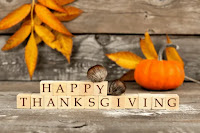Today, Thursday 23 November, 2023, I would like to thank an American family, the Dolbeys, who welcomed me as a foreign AFS exchange student over 40 years ago and taught me English around a dining table.
Thank you, Boyd, Lynn (R.I.P.), Charlie, Cathy and Christie, in times of joy and in times of sorrow.
*****
Thanksgiving is a national holiday in the United States, Canada, some Caribbean islands and even in Liberia. Wikipedia explains the history and traditions of this peculiar holiday all around the world, in an article which is rather long and complex, so it is recommended for C1 students if you want to read it all . Some of the interesting words you can find in this article are: blessing, harvest, failure, settlers, to flee, God Almighty, to be prompted, relief, siege, to beseech, sham, to observe a festivity, to dub, a feast, staple, non-denominational, crop, barley, oats.
The Farmers' Almanac offers a more light-hearted, hands-on approach to celebrating Thanksgiving: recipes, helpful hints, traditions, trivia & nostalgia. Each separate section could be accessible to B2 students. Some interesting words here are: to observe a festivity, to scour, a hint, to dig, to browse, mouth watering, cranberry, squash, stuffing, pumpkin, leftovers, heartburn, moist, fluffy, mashed [potatoes], yummy, stew, a riddled, jellied.
There are several videos on YouTube which give you complementary views of Thanksgiving. An easy video to introduce foreign students to the basics is Thanksgiving History & Traditions. ESL/ESOL/EFL A1- A2, (3:47) which, despite its title, is more suitable for B1 learners (you can read the subtitles). Some interesting words you will find are: an occasion, pilgrim, voyage, to land, crops, to grow [corn], harvest, roast, turkey, cranberry sauce, pumpkin pie, parade.
A more detailed account of the story of Thanksgiving can be found in The Real Story of Thanksgiving, (11:42), where you can thoroughly learn about the sailing difficulties of the Mayflower, how the Pilgrims built the first settlement and the story of the individual Indians and tribes that hepled the settlers: Sumoset an Abenaki Indian; Squanto, a Patuxet Indian who was kidnapped and taken to Spain and England where he became fluent in English and the Wampanoag tribe who formed a military alliance with the Europeans against other Indian enemy tribe, namely, the Narragansetts. This video with subtitles is fast and dense, and it contains a lot of technical and colloquial expressions, so it is recommended for C2 students and above. Some interesting vocabulary: kumbaya, pier, bound for, a spit, speedwell, ungainly, to make it [to America], dissenters, haunt, to have more say, a printing press, a bad rap, flattering, creaky [boat], undaunted, glee, to be refitted, to botch, to cram, a snap, a beam, a spare, buckling, delays, a screw, to be kicked out, to cite land, to set up anchor, dodgy, to be set down, scurvy, icy, to send out, to be aboard, to drape, arrows, muskets, pilgrims, to search the area, claws, riddled, timber, to be wiped out, picky, to huddle together], to thaw, the crew, a storehouse, the locals, promptly, supplies, to swap, the chief, to be beset, a cannon, unlikely, tutelage, to thrive, bounty, game birds, waterfowl, deer, eel, crab, harvest, to set aside their differences.
A more critical view of the encounter of the two civilizations can be seen in the First Thanksgiving video (6:09) which takes pride to show the "true events" behind the fairy tale that is taught at primary schools: the complex political and religious background to the Mayflower Pilgrims's exile into the New World and the troubled relationships between the native Americans and the Pilgrims. This video is fast and quite complex in content so, it can be suitable for C2 students. Some interesting expressions are: dawn, deceitful, settlement, in droves, to be wiped out, the fate, pilgrims, to flee (fled), the congregation, to pay off the debt, to be spotted, a grave, a storage pit, furs, a hostage, to keep an eye on, bountiful, to entertain, settlers, to fast, to be up to something, to overthrow, swift, sachem, a conspiracy, preemptive, to outnumber, godless, the outcome, to surrender, short-lived, zealous beliefs, to wipe away, the fairy tale.
If you want to find out about how Thanksgiving is celebrated in other countries around the world, like Canada, China, Korea, the Caribbean, Liberia, Germany or Japan, you can watch Thanksgiving around the world (7:01). The script in this video with subtitles is more simple, colloquial and the delivery is less fast, so, perhaps it can be OK for B2 students and above. Some interesting expressions are: a feast, to compile, to get together, mashed potatoes, to chow down, casserole, cranberry, crew, treacherous, pastry, a filling, goddess, the eve, quality time, a bonding activity, odd, tiny, to be overthrown, a coup, a whaling ship, a whaler, a feast, a harvest festival, the bounty of crops.
A final option is to watch the video The History of the Holidays: the History of Thanksgiving (3:25). This is a summary of the history of the festivity and the modern celebrations, a short version of the texts and videos above. The language is not too hard, so it can be accessible to B2 students. You can also find the video at the bottom of this entry too. Some interesting vocabulary that you will find here: iconic, a feast, their bounty, staple, codfish, lobster, fasting, prayer, bountiful harvests, drought, to decree, to set about establishing, to urge politicians, leisure, to boost attendance, fledging, a kickoff, to brave the cold, a collective breath, to reconnect with loved ones.
In 2023, Thanksgiving will be celebrated on Thursday 23rd November in the USA.

